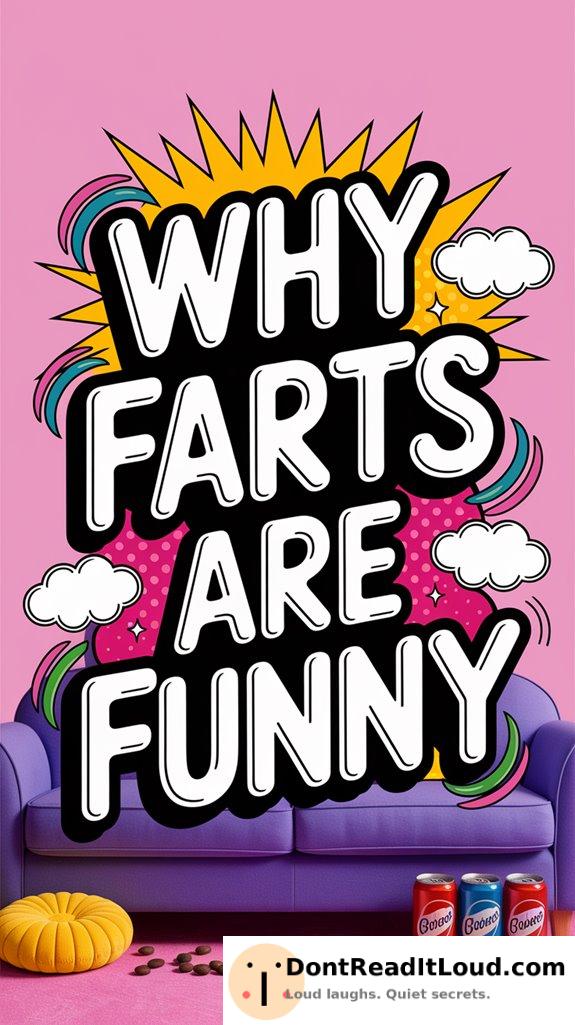
Farts are funny because they break social norms and catch you off guard, highlighting the contrast between decorum and our natural behavior. This taps into the incongruity theory of humor, where unexpected events trigger laughter. Throughout history, fart jokes have entertained people, resonating because they reflect our shared human experiences. Fart humor also creates a sense of camaraderie by easing awkward moments and pointing out universal truths. Stick around to learn more about this classic comedic staple.

Why do farts make us laugh? It might seem like an odd question, but it’s one that touches on deep-seated aspects of flatulence stereotypes and humor psychology. At the heart of laughter lies the breaking of social taboos. Across cultures, farting is usually considered impolite, so when it happens in public, it catches everyone off guard. This breach of etiquette often triggers giggles because it highlights our shared humanity and the universality of bodily functions. Laughter serves as a social tool to diffuse the embarrassment of someone breaking this unspoken rule.
The unexpected nature of a fart also plays an essential role in why it’s funny. According to incongruity theory, humor arises when something subverts our expectations. Farts, often occurring at the most inopportune moments, fit this mold perfectly. Imagine a formal occasion suddenly interrupted by the unmistakable sound of flatulence. The laughter that follows isn’t just about the noise, but about the absurdity of a basic act intruding on serious moments. It playfully reminds us that everyone, no matter their status, shares these natural experiences. The Marmaduke Fart Paradox illustrates this concept by depicting flatulence as both humorous and offensive, challenging the limits of acceptable behavior.
The psychology of humor also suggests that farts draw laughter due to relief and superiority theories. When someone farts, it’s like witnessing a small, controlled loss of dignity. People laugh because it’s a release of the mental energy we expend trying to maintain social decorum. There’s a momentary feeling of superiority, but it’s tempered by the understanding that everyone is affected by this bodily function, making the humor more inclusive rather than mean-spirited.
Historically, flatulence has been a comedic staple. From ancient Sumeria’s fart jokes to Aristophanes’ plays, humor involving farts has been a longstanding tradition. Literary giants like Chaucer and Shakespeare didn’t shy away from it either, utilizing flatulence to draw laughs and sometimes even social commentary. This history shows that while views on farts have changed, their potential for comedy has always been clear.
Ultimately, a fart’s humor is a complex interplay of social norms, surprise, shared humanity, and psychological factors. It’s not just about the act itself but what it represents: a universal truth that everyone, regardless of status, experiences the same bodily functions. Laughing at farts becomes a bonding experience, reducing awkwardness and fostering a sense of camaraderie.
Conclusion
In the end, you can’t help but laugh at a classic fart. This type of humor crosses cultures and generations, uniting people in shared amusement. The unexpected noise, the element of surprise, and even the boldness all add to the joke. You might try to hold back, but a giggle usually slips out. Enjoy the joke and let yourself laugh—these moments remind us not to take life too seriously.



